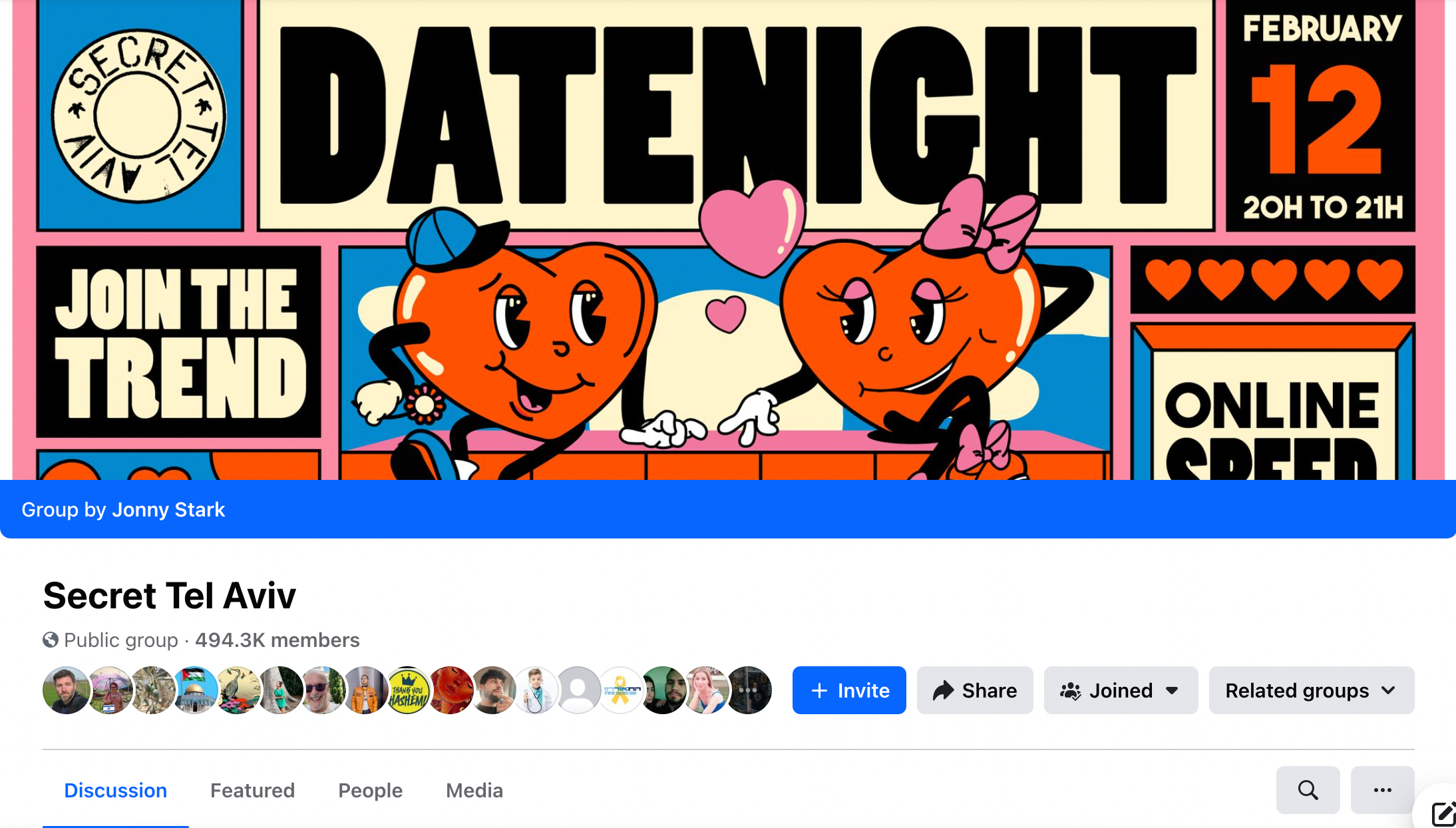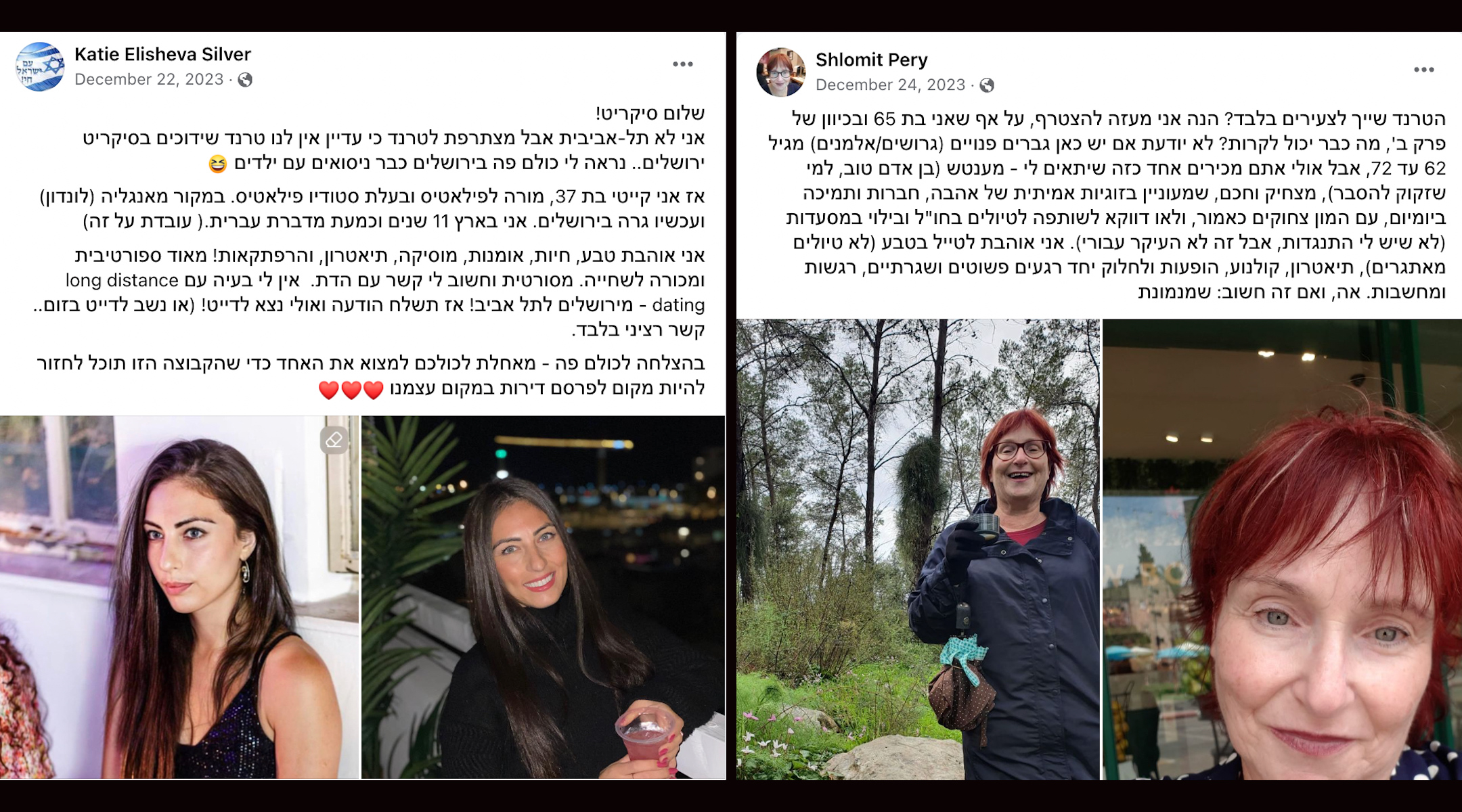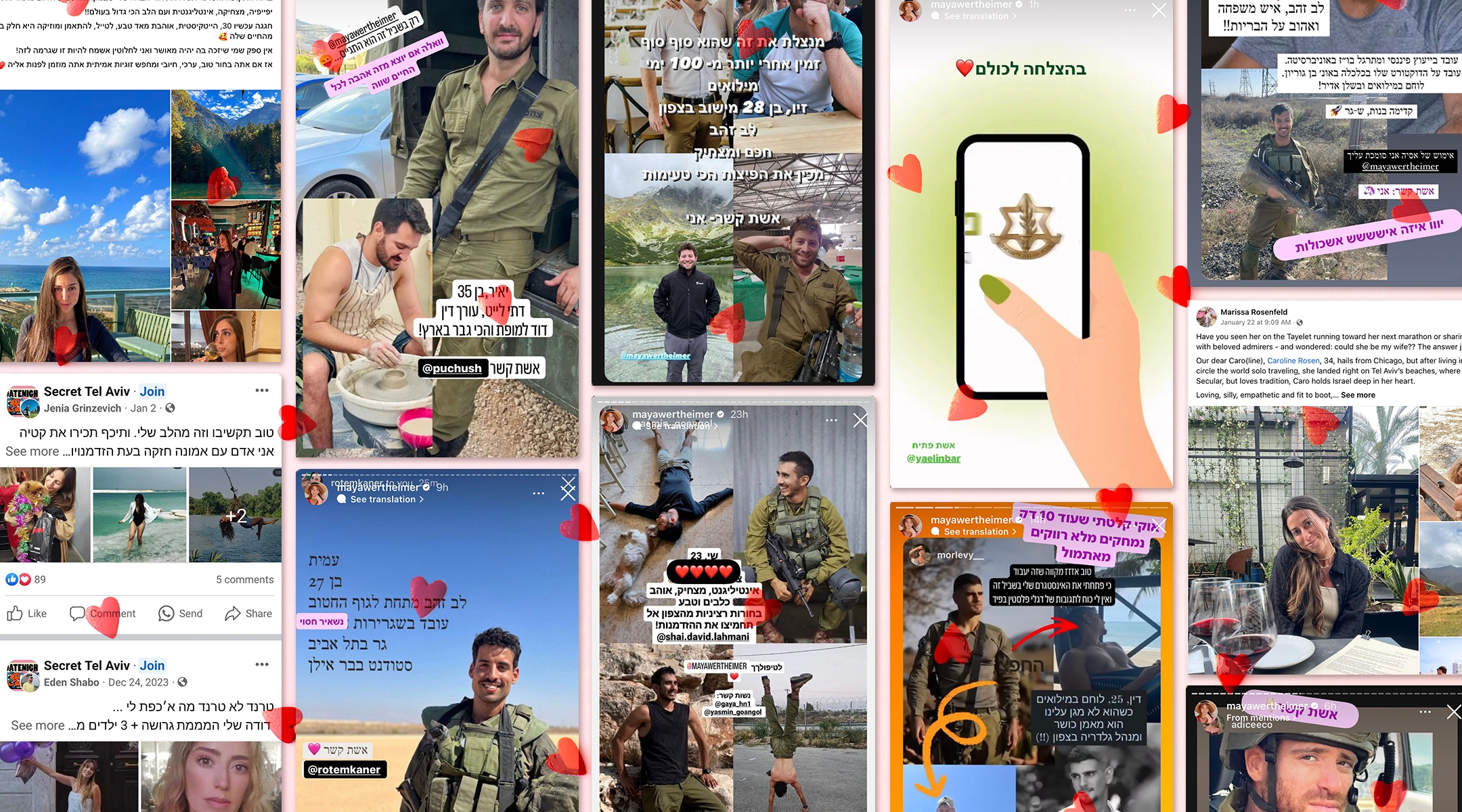(JTA) — Katie Silver had already mastered volunteering and racing to safe rooms when she hopped on another Israeli wartime trend. Silver, a pilates instructor in Jerusalem, logged onto a Facebook group called Secret Tel Aviv and announced that she was looking for love.
Like many single 30-somethings, Silver had tried dating apps but felt burned out. But she saw something different in what was happening in the Secret Tel Aviv group, where diverse residents of Israel’s hippest city — and, increasingly, others from elsewhere in the country — were furiously posting their personal details and romantic ambitions. In the flood of beach photos and biographies, she detected a national mood that matched her own.
“There’s a sense of urgency of creating togetherness, family, community and bringing more good people into the world with good values … not to let evil win out,” Silver told the Jewish Telegraphic Agency. “To celebrate life and have joy and simcha and weddings and bar mitzvahs and of course to make more Jewish babies so the population numbers can go back up.”
She added, “Plus, I want to get married before a rocket lands on my head.”
According to Secret Tel Aviv’s administrator, Jonny Stark, the matchmaking trend began in the first weeks of the war amid daily rocket fire, with posts from people seeking to find “the one to run to the bomb shelter with.” Those soon morphed into more general personal ads, which peaked in December but have continued since, increasingly with humorous twists on the theme.
Stark provided JTA with graphs showing a dramatic increase in engagement and comments as hundreds of posts seeking partners poured into the group. Posters include new members like Liat Admati MacKie from Beeri, one of the “envelope” communities near Gaza that was hardest hit on Oct. 7, and veteran members like Ben Raul Maizel, whose humorous post racked up more than 4,000 likes. Maizel’s post reads: “I want to take my girlfriend to a B&B in the north. Can anyone recommend a girlfriend?”

The Facebook group Secret Tel Aviv has devoted itself to facilitating dating in response to a surge in matchmaking posts since Oct. 7. (Screenshot)
Stark said that during past times of conflict, similar trends have emerged in his group — but never on such a scale.
“People are looking for connection,” he said. “I’m super happy about it. The goal of Secret Tel Aviv is to help people connect and this is a great example of it happening.”
The Facebook group is hardly the only example of wartime matchmaking on overdrive. In the days after Hamas’ Oct. 7 attack on Israel, as soldiers massed on the border with Gaza, pictures of soldiers flexing their “miluim mustaches” — using the Hebrew word for reserve duty — punctured the somber mood. Some noted that they were single and would be available once they were released from duty.
Just a few days into the ground war, an Orthodox influencer who had been called up posted that his unit received, among the letters of support from people at home and abroad, a note from a young woman who was looking for love.
The woman shared that Rabbi Nachman of Breslov, an influential Hasidic rabbi from the early 19th century, taught that wars “are about moving people around so that single people can find each other.” The message may be apocryphal, but it left a mark on the unit and later that night, they tried to connect the woman with a friend in the army, Arky Staiman said on Instagram.
“It didn’t end up working out but the message was very interesting,” Staiman said, before issuing a charge to his followers to each identify three people to set up after the war. ”There are girls and guys, single people, who are alone right now alone in Israel, alone throughout the world. It’s probably very scary. And I think that this is a perfect opportunity to try and set them up.”
Actress Maya Wertheimer, one of Israel’s most widely followed social media influencers, has peppered her accounts with singles ads since the beginning of the war. She has used her Instagram platform to showcase soldiers who are looking for love, sharing their basic details along with pictures of the men in and out of uniform — often submitted by their sisters and friends.
Other influencers, including the American-Israelis Kerry Bar-Cohn, a dancer with almost 30,000 Instagram followers, and Aleeza Ben Shalom, the celebrity matchmaker, have sought to highlight soldiers who are single, as well as comfort the love-lorn.
“These guys, our soldiers, who are out there and they are fighting — a lot of them are single. And when they come back, we’ve got male and female soldiers and they are looking for soulmates,” Ben Shalom told her followers in December. “So if you are looking for your soulmate, it just might be a soldier, so hang in there, they are going to take care of everything and then they’re going to come back and marry you.”
And in New York City, an Orthodox synagogue launched a matchmaking initiative in response to the war in November. Hundreds of people signed up within days, and at least a few relationships have started there, according to its organizers.
“Everyone’s trying to figure out what to do from here,” Avital Chizhik-Goldschmidt, the congregation’s co-founder and rebbetzin, told the New York Jewish Week at the time. “I felt very much that the best way to respond to darkness and death is to bring in more light and more love and to bring people joy. Traditionally, that is the Jewish response to catastrophe.”
Stark understands the impulse to find a partner well. One of the reasons he founded Secret Tel Aviv — where anything from parking places (or the lack thereof) to the best ramen in the city is discussed — was to find a partner. He ultimately found one elsewhere and now has two children — but his group has taken on a life of its own since its launch in 2010. It has exploded to nearly half a million members — exceeding the size of Tel Aviv’s entire population — and at one point even counted Facebook founder Mark Zuckerberg among them. The potential for pairing up is huge.
Stark said he knows about at least three couples who met and married through posts on Secret Tel Aviv. He added that it was too early to tell if this round of posts had yet had the desired effect. But he is trying to stack the deck in their favor: Secret Tel Aviv has partnered with DateNight, a platform that hosts online speed dating nights, and recently attracted more than 150 people to one event.
Members of the Facebook group have reported wide-ranging experiences. Noa Salant, 40, told JTA that she had gotten direct messages only from “some perverts and a married man.” Shlomit Pery, 65, said she had been bombarded with responses to her post, one of the most-liked in the group — but mostly from people who said they were impressed that she had the courage to put herself out there at her age.

Katie Silver and Shlomit Pery are among the many people to look for love in the Secret Tel Aviv Facebook group since Oct. 7. (Facebook)
In a Hebrew-language post, Silver, a pilates instructor who immigrated to Jerusalem from London in 2012, included a brief biography and several photos of herself. She opened the post by quipping that she wasn’t having much luck finding love in Israel’s capital “because apparently everyone in Jerusalem is married with kids.” She clarified that she was only searching for a serious relationship before ending the post with another quip: “I hope you all find ‘the one’ so that this group can return to being a place to advertise apartments instead of ourselves.”
She said she was so overwhelmed with offers of dates that she had to turn off her phone — and when she finally went on a few, she didn’t find a lasting match.
“It hasn’t led to love — yet — but it’s been eye opening,” Silver said about her experience. “It’s also allowed me to be much more honest about what I’m looking for. It removed the stigma. You’re no longer too proud or too embarrassed to put yourself out there because you sort of see that we’re all in the same boat, looking for love.”
Some group members have lambasted the trend, charging that it distracts from the original purpose of Secret Tel Aviv or is even a catfishing effort by Hamas to collect information about Israelis.
But others say simply watching the posts unfold has kept them connected to others at a challenging time. Limor Stika, who did not put up a post herself but who commented on several others’, said it made sense that the war was bringing the trend to the fore.
“In times of crisis and wars, people want support and love, comfort,” Stika said. “Someone to hug and vent to.”
With more soldiers returning to their daily lives after being released from reserve duty every day, Wertheimer has intensified the pace of her postings — and even floated the idea of a live dating event for older adults.
Recently, she posted news of a success story. “I must tell you that because of you I got to know my partner of the last three months,” read a note she posted on Friday. “I thank you very much. There’s no doubt that he is the best match for me in the world.”
The note came with five heart emojis and a comment from Wertheimer: “Yalla, friends, we’ve waited long enough!”
JTA has documented Jewish history in real-time for over a century. Keep our journalism strong by joining us in supporting independent, award-winning reporting.






